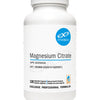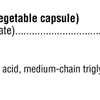Magnesium plays a vital role in hundreds of metabolic reactions. This mineral particularly aids in muscle function. Magnesium, the fourth most abundant mineral in the body, is involved in more than 300 enzymatic reactions in nearly every tissue. Deficiencies are common. The average American diet is thought to provide about 40% of the daily magnesium requirement, and reports from the World Health Organization have suggested that three-quarters of Americans do not meet their daily requirements. Furthermore, because magnesium is primarily an intracellular cation, serum magnesium remains a poor indicator of tissue magnesium content and availability; therefore, deficiency can sometimes go undetected. Magnesium deficiency can result from inadequate dietary intake, malabsorption, and excessive losses through urine, feces, perspiration, or breastfeeding. Certain medications, herbs, poor kidney function, excessive alcohol consumption, and drinking primarily "soft" water can contribute to magnesium depletion. It is also important to note that physical and emotional stress increase magnesium requirements, and hypomagnesemia and stress potentiate each other's negative effects. In addition, the adrenergic effects of psychological stress cause magnesium to shift from the intracellular to the extracellular space, increasing urinary excretion and depletion of body stores. Magnesium is involved in the development and maintenance of bones and teeth, the metabolism of carbohydrates, proteins, and fats, cell and tissue formation, cytokine modulation, and the maintenance of muscle function, including the heart. Magnesium, in the form of magnesium citrate, is often used short-term to facilitate bowel movements, and some people find it helpful in preventing calcium crystallization in the kidneys.
Adults: Take 1 capsule daily as directed by your healthcare professional.
Medicinal ingredients (per capsule): Magnesium (magnesium citrate) 100 mg Non-medicinal ingredients: Capsule (hypromellose and water), ascorbyl palmitate and silica.



